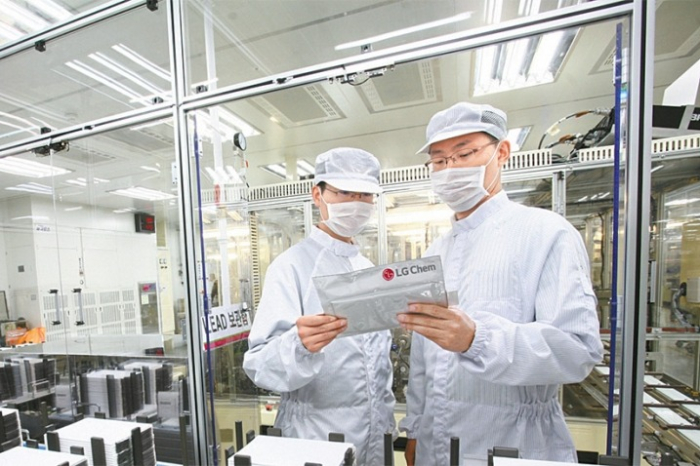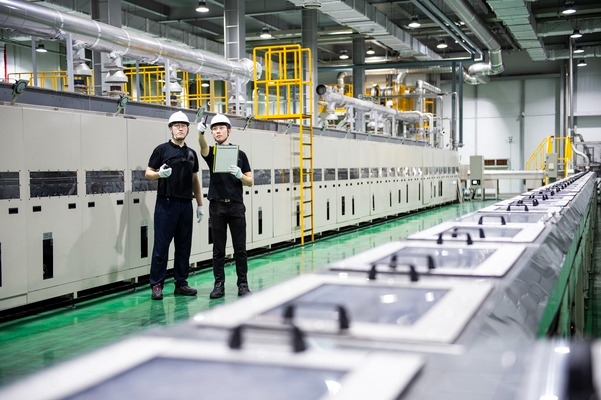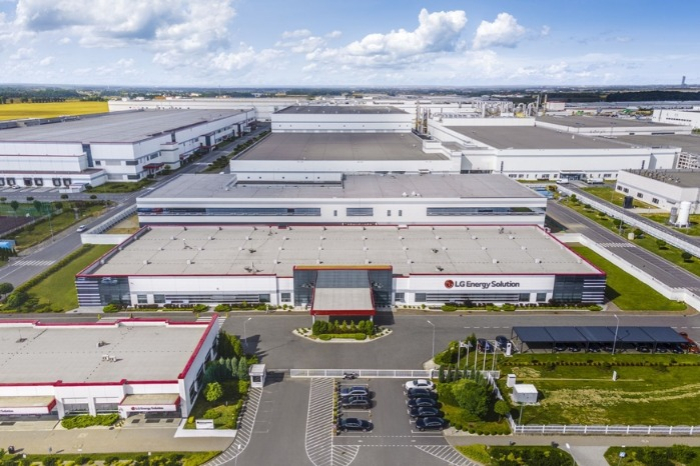Batteries
US regulations push Korean battery industry to cut reliance on China
Korean firms adjust Chinese partners' ownership in battery material JVs; EV oversupply also impacts their production plans
By Dec 12, 2023 (Gmt+09:00)
4
Min read
Most Read
LG Chem to sell water filter business to Glenwood PE for $692 million


Kyobo Life poised to buy Japan’s SBI Group-owned savings bank


KT&G eyes overseas M&A after rejecting activist fund's offer


StockX in merger talks with Naver’s online reseller Kream


Mirae Asset to be named Korea Post’s core real estate fund operator



The South Korean battery industry is facing pressure to cut its reliance on Chinese capital as the US government on Dec. 1 issued guidance that will exclude Chinese minerals in batteries eligible for electric vehicle tax credits starting next year.
The US Inflation Reduction Act (IRA), which includes a subsidy of up to $7,500 per EV, will begin limiting financial support for batteries that have components or critical minerals originating from “Foreign Entity Of Concern” (FEOC) nations – China, Russia, North Korea and Iran.
The subsidy restriction will also include companies if 25% or more of an entity’s board seats, voting rights or equity are held by an FEOC country.
Korea’s major EV battery material makers that partner with Chinese companies are considering substantial changes in their business strategy for US tax credit eligibility as North America is the world’s second-largest electric car market.

LG Chem Ltd. is planning to create the largest Korean-Chinese partnership for battery material plants. The top chemicals company in Korea and Zhejiang Huayou Cobalt Co. have launched a 1.2 trillion won ($912.9 million) joint venture to make precursors and a 500 billion won JV for cathode production.
Huayou holds a 49% stake in the cathode production JV, while the Chinese partner and LG Chem are working out the shareholding ratio in the precursor production entity.
In April, LG Chem said that it is considering buying the entire stake Huayou owns in the cathode JV if the FEOC exclusion includes entities with ownership by a Chinese firm. But LG Chem no longer has the financial flexibility for such a deal amid a slowdown in the global petrochemical industry and its $2 billion exchangeable bond issuance in July, market watchers say.
POSCO Group, the top steelmaker in Korea, is also considering adjusting its ownership in JVs it has founded with Chinese companies.
In June, the group’s holding firm POSCO Holdings Inc. and battery ingredient unit POSCO Future M Co. agreed with China’s CNGR Advanced Material Co. to spend 1.5 trillion won on plants to refine nickels and produce precursors. CNGR owns 40% and 80% stakes in the nickel refining and precursor manufacturing JVs, respectively.
POSCO Holdings also owns POSCO HY Clean Metal Plant that recycles batteries in Gwangyang, South Jeolla Province in Korea. Huayou holds a 35% stake in the plant.
Battery material maker EcoPro will establish a JV with Korean EV battery major SK On Co. and China’s GEM Co. to manufacture precursors in Saemangeum, a reclaimed area on Korea’s southwest coast. To qualify for the US tax credits, EcoPro and SK On will adjust their combined ownership to 75% or above.

OVERSUPPLY
Some battery material makers in Korea are slowing their investment on concerns about EV oversupply, not due to partnerships with Chinese firms.
Korea Zinc Co., the world’s top lead and zinc smelter, was planning to start production of copper foil, a key ingredient in EV batteries, in the third quarter of this year. But the company has pushed the schedule back to the first half of next year.
The firm has explained that the delay came as Korean battery makers, such as LG Energy Solution Ltd. SK On Co. and Samsung SDI Co., see their product quality certifications postponed. But market insiders say Korea Zinc has pushed the manufacturing schedule back as the oversupply of copper foils has impacted the battery material price.
L&F Co. will slow its investments in manufacturing precursors, lithium ferro-phosphates (LFPs), cathodes and anodes. EcoPro BM Co. said last month the cathode material maker’s facility investment for this year will reach 1.2 trillion won, 10% less than the previous forecast.
Korean battery cell makers are changing their production plans as global EV sales growth slows.
A planned battery manufacturing JV between LG Energy Solution, US automaker Ford Motor Co. and Turkish investment holding firm KOC Holding AS was scrapped last month amid concerns over the slowing pace of EV adoption. The three companies signed a non-binding agreement in February to build a plant with an annual production capacity of 25 gigawatt hours (GWh) in 2026.
“Batteries for Ford’s commercial vehicles will be supplied from our existing factories elsewhere,” said LG Energy Solution in November when it announced the JV's cancellation.
Additionally, Ford and SK On have postponed the operation of the second plant of their JV in Kentucky, the US, from the initially planned year of 2026. The decision came as Ford announced in October that it was cutting $12 billion in planned EV investment on slowing sales growth of the new energy vehicles.
LG Energy Solution, which supplies batteries to Volkswagen AG, is set to adjust the operating rate of its plant in Poland in line with the German auto giant’s EV production cutting plan.
While the FEOC rules and EV oversupply issues impact Korean firms’ investment plans, market insiders say this is an opportunity for them to review their business strategies. After years of large investments, increasing financial burden and lower operating rates of factories, the firms are taking the time to prepare for a changing environment, industry insiders say.
Write to Mi-Sun Kang at misunny@hankyung.com
Jihyun Kim edited this article.
More to Read
-
 BatteriesLG, Poland’s ICPT in mega-million-dollar battery module supply deal
BatteriesLG, Poland’s ICPT in mega-million-dollar battery module supply dealDec 08, 2023 (Gmt+09:00)
2 Min read -
 BatteriesGM asks LG Energy to share huge portion of US EV tax benefits
BatteriesGM asks LG Energy to share huge portion of US EV tax benefitsNov 30, 2023 (Gmt+09:00)
4 Min read -
 BatteriesLotte Chem develops tech to improve EV battery durability
BatteriesLotte Chem develops tech to improve EV battery durabilityNov 28, 2023 (Gmt+09:00)
2 Min read -
 BatteriesKorean battery players LG, Samsung, SK sweep US EV tax credits
BatteriesKorean battery players LG, Samsung, SK sweep US EV tax creditsApr 19, 2023 (Gmt+09:00)
4 Min read -
 Business & PoliticsKorea, Hyundai Motor request 3-year reprieve on US EV tax credit law
Business & PoliticsKorea, Hyundai Motor request 3-year reprieve on US EV tax credit lawNov 04, 2022 (Gmt+09:00)
2 Min read
Comment 0
LOG IN


